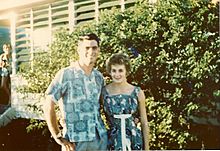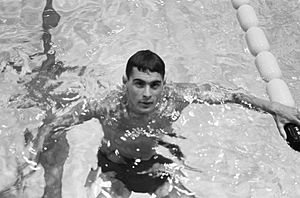John Devitt facts for kids

John Devitt and Kaye Nottle in 1956
|
|||||||||||||||||||||||||||||||||||
| Personal information | |||||||||||||||||||||||||||||||||||
|---|---|---|---|---|---|---|---|---|---|---|---|---|---|---|---|---|---|---|---|---|---|---|---|---|---|---|---|---|---|---|---|---|---|---|---|
| Born | 4 February 1937 Granville, New South Wales, Australia |
||||||||||||||||||||||||||||||||||
| Died | 17 August 2023 (aged 86) | ||||||||||||||||||||||||||||||||||
| Height | 1.85 m (6 ft 1 in) | ||||||||||||||||||||||||||||||||||
| Weight | 85 kg (187 lb) | ||||||||||||||||||||||||||||||||||
| Sport | |||||||||||||||||||||||||||||||||||
| Sport | Swimming | ||||||||||||||||||||||||||||||||||
| Strokes | Freestyle | ||||||||||||||||||||||||||||||||||
| Club | Manly Swimming Club | ||||||||||||||||||||||||||||||||||
|
Medal record
|
|||||||||||||||||||||||||||||||||||
John Thomas Devitt (born 4 February 1937 – died 17 August 2023) was an Australian freestyle swimmer. He was famous in the 1950s and 1960s. John won a gold medal in the 100-metre freestyle at the 1960 Summer Olympics in Rome. This win was a bit controversial. He got the gold medal even though some timers thought the American swimmer, Lance Larson, was faster. John also won a gold medal at the 1956 Summer Olympics in Melbourne. This was for the 4×200-metre freestyle relay race.
Contents
Early Life and Training
John Devitt grew up very close to the Granville Olympic Pool. He learned to swim through a government program called Learn to Swim. He went to Catholic schools, Holy Family Primary School and Parramatta Marist High School. He also swam for his school teams.
John first trained with Tom Penny at the Clyde Swim Club. When that club closed, he moved to Manly Swim Club with Penny. Penny had a special way of training. He let his swimmers practice in warm water. They would swim against the current from a power plant. John believed this training helped him. It taught him to swim well no matter the conditions. He felt he could handle "rain, heat, currents or any other natural or unnatural variables."
Starting His Swimming Career
John Devitt first competed at a national level in 1952. He was often overshadowed by his clubmate, Barry Darke. Darke set many Australian records in their age group. In 1953, Darke retired, and John started to do much better.
However, in the adult competitions, he often lost to other great swimmers. These included Jon Henricks in sprints. He also competed against Gary Chapman and Murray Rose in longer races. Rose and Henricks later won gold medals at the 1956 Olympics.
Becoming a Team Captain
In 1955, when John was 18, he became the captain of the New South Wales team. This was for the Australian Championships. Henricks was injured at first, but he recovered. He then beat John in the 110-yard freestyle. John also got a silver medal in the 220-yard freestyle, behind Murray Rose.
John decided to focus on sprint swimming. This caused some disagreements with his coach, Penny. So, John decided to coach himself. When his swimming started to get worse, he thought about quitting. But then he joined Sam Herford at the Spit Baths. He trained there with Murray Rose.
Olympic Success and World Records
At the 1956 Australian Championships, John finished third in the 110-yard race. He also came fifth in the 220-yard race. These results helped him get chosen for the Olympics. After a long training camp, John was named the national captain for the 1956 Summer Olympics in Melbourne.
Melbourne 1956 Olympics
John's first event was the 100-metre freestyle. He swam well in his heat and semi-final. In the final, he was neck and neck with Henricks for most of the race. But Henricks pulled ahead to win the gold. Chapman finished third, making it an all-Australian medal sweep.
For the 4×200-metre freestyle relay, John had one of the fastest times. He swam the fastest part in the heats. He was then chosen for the final team. The team included Rose, Henricks, and Kevin O'Halloran. The Australian team won the gold medal. They also set a new world record. John swam the fastest part of the race for the whole team.
Setting New Records
In 1957, John set a world record in both the 100-metre and 110-yard freestyle races. He later lowered the 100-metre freestyle world record to 54.6 seconds. He then won his first individual Australian title in the 110-yard freestyle.
With Henricks and Rose studying in the United States, John became Australia's top freestyle swimmer. He decided to keep swimming until the 1960 Summer Olympics. He worked as a health inspector to support himself.
Commonwealth Games Gold
In 1958, John won the Australian 110-yard title again. He then won three gold medals at the 1958 British Empire and Commonwealth Games in Cardiff, Wales. He won the 110-yard freestyle. He also won the 4×110-yard freestyle and medley relays. In 1959, he again improved his 110-yard freestyle time. However, he was later beaten by John Konrads at the Australian Championships. Konrads won every freestyle title that year.
Rome 1960 Olympics and Controversy
In 1960, John won his 110-yard Australian title back. Before the 1960 Summer Olympics in Rome, he helped break a relay record. This was for the 4×100-yard freestyle relay. His teammates were Henricks, Geoff Shipton, and David Dickson.
At the 110-yard freestyle trial, John came third. Henricks and Shipton were ahead of him. But John was chosen as the second Australian swimmer for the Olympics. This was a bit controversial, as Shipton was ignored. John was also named the national captain again.
When they arrived in Rome, Henricks got sick and could not compete. In the 100-metre freestyle final, John had a good lead. But in the last 10 metres, American swimmer Lance Larson caught up. It looked like they both touched the wall at the same time.
- Two of the three judges said John won first place.
- Two of the three judges for second place thought John came second.
- All three timekeepers thought Larson won. They timed Larson at 55.0, 55.1, and 55.1 seconds. They timed John at 55.2 seconds.
Even with these different results, the chief judge made the final decision. He said both swimmers had a time of 55.2 seconds. He then gave the gold medal to John. The United States team protested this decision. They even had video that seemed to show Larson winning. But the appeal jury, led by Jan de Vries, said no. John remained the gold medalist. This event was very important for swimming. It led to the use of electronic touchpads. These pads now help decide who finishes first and give exact times.
Life After Swimming
After the Rome Olympics, John Devitt stopped competitive swimming. He started working for the company Speedo. He began as a salesman. He then became the manager for Europe. Later, he managed the International section.
In 1979, he started his own company with Terry Gathercole. They sold swimming equipment. In the 1980s, John became involved in Olympic administration. He worked on the executive committee for the Australian Olympic Committee (AOC). He helped Sydney win its bid to host the 2000 Summer Olympics. He was also the Australian team manager for the 2006 Commonwealth Games.
In 2017, John Devitt and author Larry Writer traveled to France. They were researching the story of Cecil Healy. Healy was an Australian soldier and Olympic gold medalist. He was killed in World War I. In 2018, they launched their book, Cecil Healy: A Biography. The book was launched by John Coates from the AOC and Governor of New South Wales, General David Hurley.
John Devitt passed away on 17 August 2023, at 86 years old.
Honours and Awards
John Devitt received many awards for his swimming career:
- In 1979, he was added to the International Swimming Hall of Fame.
- In 1986, he was inducted into the Sport Australia Hall of Fame.
- In 1989, he was made a Member of the Order of Australia (AM).
- In 2000, he received an Australian Sports Medal.
Images for kids
See also
 In Spanish: John Devitt para niños
In Spanish: John Devitt para niños
- List of members of the International Swimming Hall of Fame
- List of Commonwealth Games medallists in swimming (men)
- List of Olympic medalists in swimming (men)
- World record progression 100 metres freestyle
- World record progression 4 × 100 metres freestyle relay
- World record progression 4 × 200 metres freestyle relay
 | Delilah Pierce |
 | Gordon Parks |
 | Augusta Savage |
 | Charles Ethan Porter |



